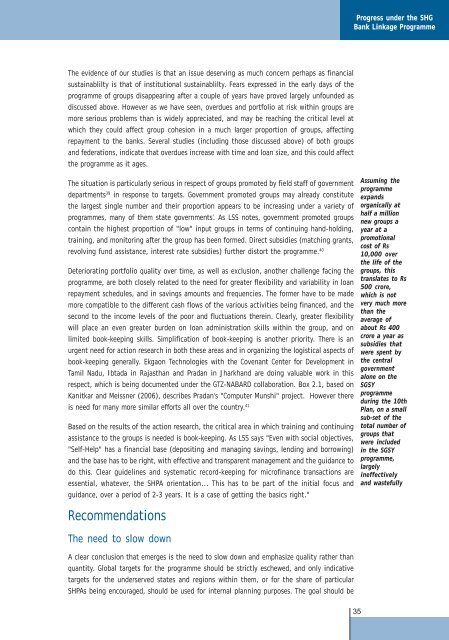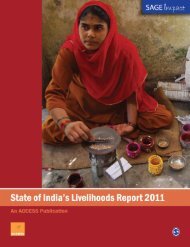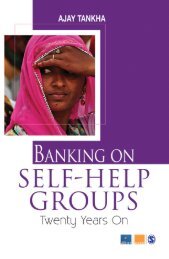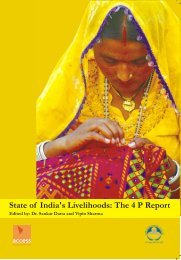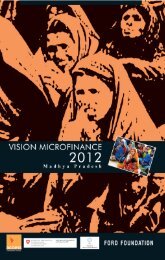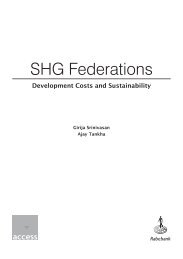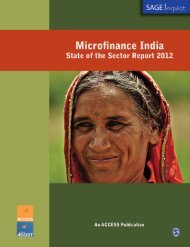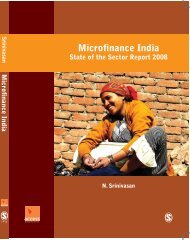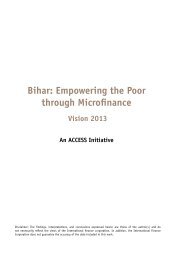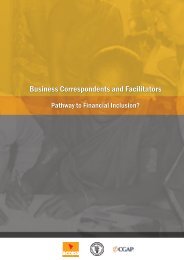Download sector_report1.pdf - Microfinance and Development ...
Download sector_report1.pdf - Microfinance and Development ...
Download sector_report1.pdf - Microfinance and Development ...
You also want an ePaper? Increase the reach of your titles
YUMPU automatically turns print PDFs into web optimized ePapers that Google loves.
Progress under the SHG<br />
Bank Linkage Programme<br />
The evidence of our studies is that an issue deserving as much concern perhaps as financial<br />
sustainablilty is that of institutional sustainablilty. Fears expressed in the early days of the<br />
programme of groups disappearing after a couple of years have proved largely unfounded as<br />
discussed above. However as we have seen, overdues <strong>and</strong> portfolio at risk within groups are<br />
more serious problems than is widely appreciated, <strong>and</strong> may be reaching the critical level at<br />
which they could affect group cohesion in a much larger proportion of groups, affecting<br />
repayment to the banks. Several studies (including those discussed above) of both groups<br />
<strong>and</strong> federations, indicate that overdues increase with time <strong>and</strong> loan size, <strong>and</strong> this could affect<br />
the programme as it ages.<br />
The situation is particularly serious in respect of groups promoted by field staff of government<br />
departments 39 in response to targets. Government promoted groups may already constitute<br />
the largest single number <strong>and</strong> their proportion appears to be increasing under a variety of<br />
programmes, many of them state governments’. As LSS notes, government promoted groups<br />
contain the highest proportion of "low" input groups in terms of continuing h<strong>and</strong>-holding,<br />
training, <strong>and</strong> monitoring after the group has been formed. Direct subsidies (matching grants,<br />
revolving fund assistance, interest rate subsidies) further distort the programme. 40<br />
Deteriorating portfolio quality over time, as well as exclusion, another challenge facing the<br />
programme, are both closely related to the need for greater flexibility <strong>and</strong> variability in loan<br />
repayment schedules, <strong>and</strong> in savings amounts <strong>and</strong> frequencies. The former have to be made<br />
more compatible to the different cash flows of the various activities being financed, <strong>and</strong> the<br />
second to the income levels of the poor <strong>and</strong> fluctuations therein. Clearly, greater flexibility<br />
will place an even greater burden on loan administration skills within the group, <strong>and</strong> on<br />
limited book-keeping skills. Simplification of book-keeping is another priority. There is an<br />
urgent need for action research in both these areas <strong>and</strong> in organizing the logistical aspects of<br />
book-keeping generally. Ekgaon Technologies with the Covenant Center for <strong>Development</strong> in<br />
Tamil Nadu, Ibtada in Rajasthan <strong>and</strong> Pradan in Jharkh<strong>and</strong> are doing valuable work in this<br />
respect, which is being documented under the GTZ-NABARD collaboration. Box 2.1, based on<br />
Kanitkar <strong>and</strong> Meissner (2006), describes Pradan's "Computer Munshi" project. However there<br />
is need for many more similar efforts all over the country. 41<br />
Based on the results of the action research, the critical area in which training <strong>and</strong> continuing<br />
assistance to the groups is needed is book-keeping. As LSS says "Even with social objectives,<br />
"Self-Help" has a financial base (depositing <strong>and</strong> managing savings, lending <strong>and</strong> borrowing)<br />
<strong>and</strong> the base has to be right, with effective <strong>and</strong> transparent management <strong>and</strong> the guidance to<br />
do this. Clear guidelines <strong>and</strong> systematic record-keeping for microfinance transactions are<br />
essential, whatever, the SHPA orientation… This has to be part of the initial focus <strong>and</strong><br />
guidance, over a period of 2-3 years. It is a case of getting the basics right."<br />
Assuming the<br />
programme<br />
exp<strong>and</strong>s<br />
organically at<br />
half a million<br />
new groups a<br />
year at a<br />
promotional<br />
cost of Rs<br />
10,000 over<br />
the life of the<br />
groups, this<br />
translates to Rs<br />
500 crore,<br />
which is not<br />
very much more<br />
than the<br />
average of<br />
about Rs 400<br />
crore a year as<br />
subsidies that<br />
were spent by<br />
the central<br />
government<br />
alone on the<br />
SGSY<br />
programme<br />
during the 10th<br />
Plan, on a small<br />
sub-set of the<br />
total number of<br />
groups that<br />
were included<br />
in the SGSY<br />
programme,<br />
largely<br />
ineffectively<br />
<strong>and</strong> wastefully<br />
Recommendations<br />
The need to slow down<br />
A clear conclusion that emerges is the need to slow down <strong>and</strong> emphasize quality rather than<br />
quantity. Global targets for the programme should be strictly eschewed, <strong>and</strong> only indicative<br />
targets for the underserved states <strong>and</strong> regions within them, or for the share of particular<br />
SHPAs being encouraged, should be used for internal planning purposes. The goal should be<br />
35


